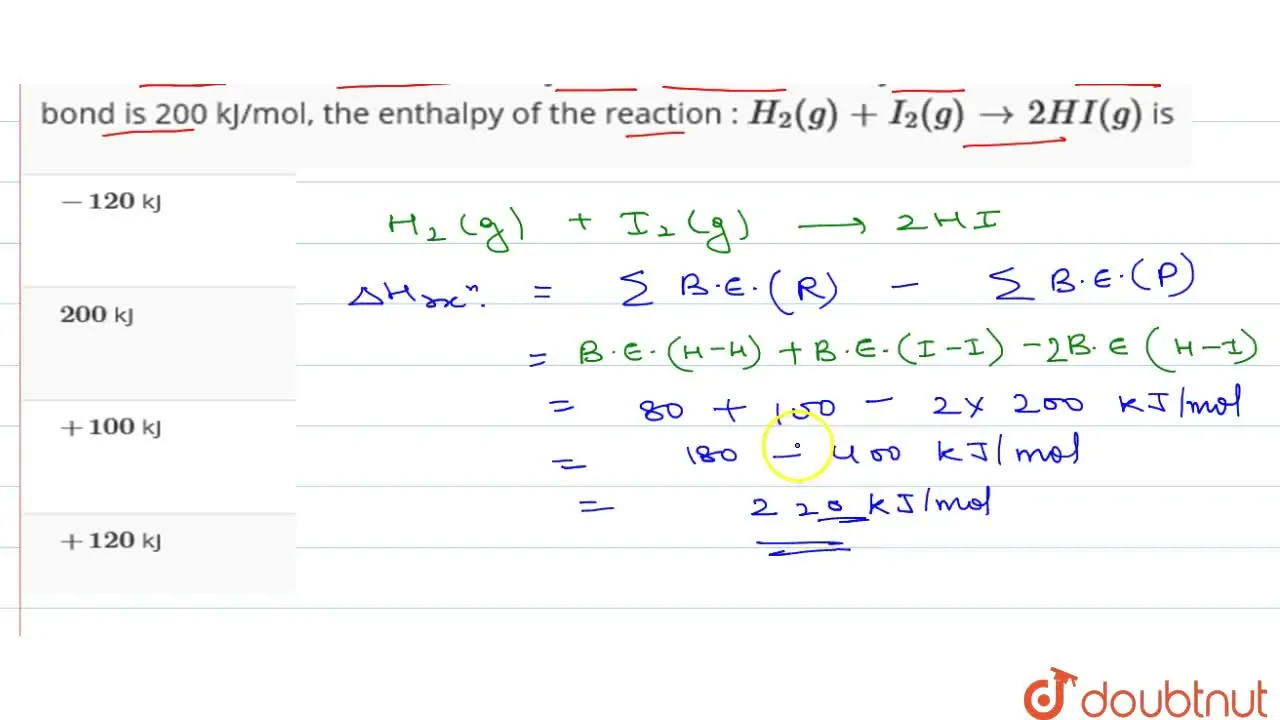Bond energies of H - H bond is 80 kJ/mol, I - I bond is 100 kJ/mol and for H - I bond is 200 kJ/mol, the enthalpy of the reaction : H2(g)+I2(g)→2HI(g) is
−120 kJ
200 kJ
+100 kJ
+120 kJ
The correct Answer is:B
Step by step video, text & image solution for Bond energies of H - H bond is 80 kJ/mol, I - I bond is 100 kJ/mol and for H - I bond is 200 kJ/mol, the enthalpy of the reaction : H_(2)(g) + I_(2)(g) rarr 2HI(g) is by Chemistry experts to help you in doubts & scoring excellent marks in Class 12 exams.
Related Playlists
- BOOK - AAKASH INSTITUTECHAPTER - THERMODYNAMICSEXERCISE - SECTION-C13videos
THERMODYNAMICS
- BOOK - AAKASH INSTITUTECHAPTER - THERMODYNAMICSEXERCISE - SECTION-D9videos
THERMODYNAMICS
- BOOK - AAKASH INSTITUTECHAPTER - THERMODYNAMICSEXERCISE - SECTION-A45videos
THERMODYNAMICS
- BOOK - AAKASH INSTITUTECHAPTER - THE SOLID STATE EXERCISE - Assignment (SECTION - D) (ASSERTION-REASON TYPE QUESTION)20videos
THE SOLID STATE
Similar Questions
Given the bond energies of N=N, H – H and N - H bonds are 945, 436 and 391kJ mol−7 respectively, the enthalpy of the reaction N2(g)+3H2(g)→2NH3(g) is :
View SolutionBond energies of N≡N,H−H and N−H bonds are 945,463 & 391 kJ mol−1 respectively, the enthalpy of the following reactions is :
N2(g)+3H2(g)→2NH3(g)View SolutionThe bond energies of H−−H , Br−−Br and H−−Br are 433,,192 and 364KJmol−1 respectively. The ΔH∘ for the reaction
H2(g)+Br2(g)→2HBr(g) isView SolutionIf the end energies of H-H, Br-Br and H-Br are 433, 192 and 364 kJ mol−1 respectively, then ΔH∘ for the reaction, H2(g)+Br2(g)→2HBr(g) is
View SolutionThe net enthalpy change of a reaction is the amount of energy required to break all the bonds in reactant molecules minus amount of energy required to form all the bonds in the product molecules.What will be the enthalpy change for the following reaction.
H2(g)+Br2(g)→2HBr(g)
Given that bond energy of H2,Br2 and HBr is 435 kJ mol−1, 192 kJ mol−1 and 368kJmol−1 respectively. (Keep your answer in magnitude and in KJ/mol)View SolutionThe bond enthalpy of C - C, C = C, H - H and C - H bonds are 350,600,400 and 410 kJ · mol-1 respectively. The enthalpy change for reaction
C2H4(g)+H2(g)→C2H6(g) isView SolutionThe net enthalpy change of a reaction is the amount of energy required to break all the bonds in reactant molecules minus amount of energy required to form all the bonds in the product molecules.What will be the enthalpy change for the following reaction.
H2(g)+Br2(g)→2HBr(g)
Given that bond energy of H2,Br2 and HBr is 435 kJ mol−1, 192 kJ mol−1 and 368kJmol−1 respectively.View SolutionThe bond energies of C-C,C=C, H-H and C-H bonds are 350 kJ mol−1, 600 kJmol−1, 400 kJmol−1 and 410 kJmol−1 respectively. The enthalpy of hydrogenation of ethane is _______________.
View SolutionThe equilibrium constant for
A(g)+B2(g)⇔AB2(g) kp=100 at 522K.
Structure of AB2 is like H2O . If bond energy of A−B bond is 200kJ/mol and that of B−B bond is 100kJ/mol, the find ΔS∘ of the above reaction :View SolutionThe bond energies of H - H and I - I bonds are 435kJmol−1and150kJmol−1 respectively. If ΔHof for HI is 26.5kJmol−1 then bond enthalpy of H-I bond is
View Solution


